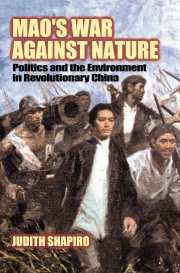Book contents
- Frontmatter
- Contents
- Chinese Measurement Equivalents
- Preface
- INTRODUCTION
- 1 POPULATION, DAMS, AND POLITICAL REPRESSION
- 2 DEFORESTATION, FAMINE, AND UTOPIAN URGENCY
- 3 GRAINFIELDS IN LAKES AND DOGMATIC UNIFORMITY
- 4 WAR PREPARATIONS AND FORCIBLE RELOCATIONS
- 5 THE LEGACY
- Notes
- Bibliography
- Index
- Plate section
4 - WAR PREPARATIONS AND FORCIBLE RELOCATIONS
How Factories Polluted the Mountains and Youths “Opened” the Frontiers
Published online by Cambridge University Press: 15 August 2009
- Frontmatter
- Contents
- Chinese Measurement Equivalents
- Preface
- INTRODUCTION
- 1 POPULATION, DAMS, AND POLITICAL REPRESSION
- 2 DEFORESTATION, FAMINE, AND UTOPIAN URGENCY
- 3 GRAINFIELDS IN LAKES AND DOGMATIC UNIFORMITY
- 4 WAR PREPARATIONS AND FORCIBLE RELOCATIONS
- 5 THE LEGACY
- Notes
- Bibliography
- Index
- Plate section
Summary
In previous chapters, we examined the impact of political repression, utopian urgency, and dogmatic formalism on China's environment. State-sponsored resettlement of Han Chinese into remote and rural areas provides a final defining them: The Chinese Communist Party's willingness to reorder society by administrative fiat, and the comparative powerlessness of Chinese people to resist these measures, were hallmarks of the Mao era. The state sometimes enticed people to volunteer to relocate with the promise of higher salaries, better future work assignments, or better living conditions. More frequently, it exacted cooperation by manipulating fears that a lack of political enthusiasm would have adverse consequences or by employing blatant coercion. Such relocations almost always had the dual purpose of transforming the landscape and accomplishing political goals.
State-induced migrations began almost immediately after the 1949 victory, when politically progressive Chinese were asked to volunteer to settle ethnic minority areas along the frontiers [zhibian]. The newcomers helped to dilute local populations, suppress opposition to Han Chinese and/or Communist rule, and provide labor to build an infrastructure for extracting and transporting rich natural resources from border regions to more developed coastal lowlands. Migrants also helped to secure and reinforce the territorial boundaries of a nation long subject to foreign incursions.
For urban Chinese, relocation was often a form of political punishment.
- Type
- Chapter
- Information
- Mao's War against NaturePolitics and the Environment in Revolutionary China, pp. 139 - 194Publisher: Cambridge University PressPrint publication year: 2001
- 8
- Cited by

